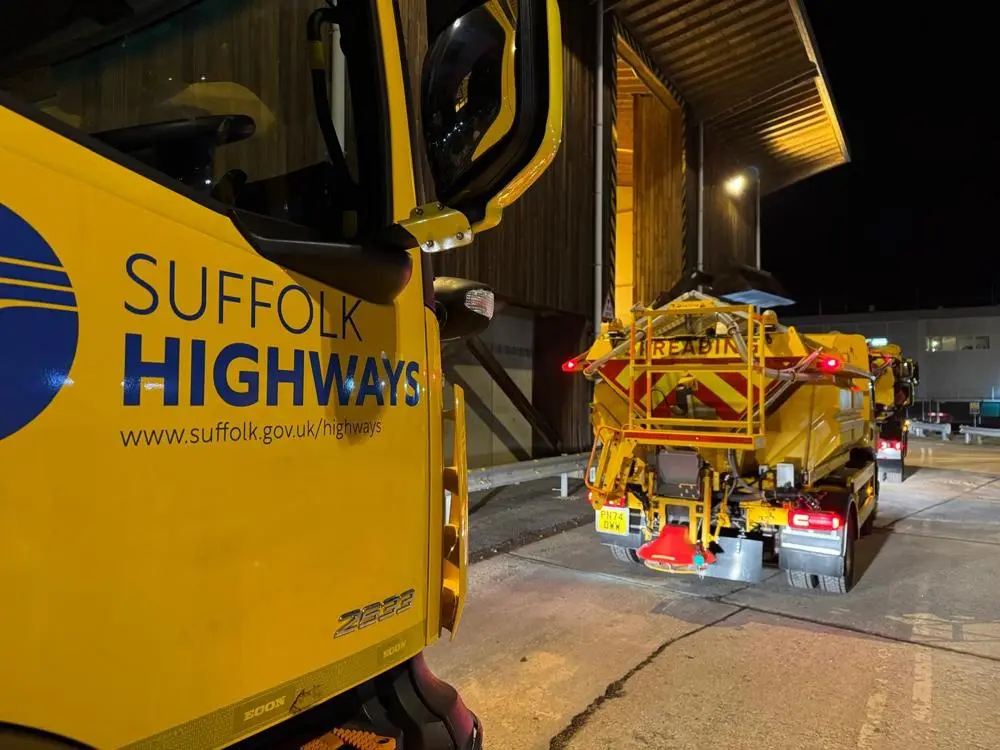As I write this column, our teams are busy getting ready to carry out countywide treatments throughout the evening.
The gritting season officially started on October 1, and despite the weather having been relatively mild so far you may well have seen gritting vehicles out and about on the roads as drivers familiarise themselves with the routes in preparation for when they go out for real.
We typically store around 22,000 tonnes of salt in barns across Suffolk to ensure we are well prepared for winter.
The campaign for 2024/25 saw a total of 10,091 tonnes of salt used to treat 81,484 miles of roads – the equivalent of driving from London to Sydney and back near four times.
Our gritting fleet is equipped with advanced digital systems and the latest route planning software to support drivers to grit their routes efficiently and effectively.
Our drivers roles are seasonal, running for the length of the gritting season from October to April, and they are based at the various highways depots across the county.
All gritters use hydrotreated vegetable oil (HVO), which reduces carbon dioxide emissions by around 90%, supporting our continued commitment to protect and enhance our environment.
Our highway teams are responsible for gritting over half the whole road network in Suffolk, including all A and B roads, roads to fire stations, hospitals, main bus routes, and rail stations.
We also treat bus routes leading to rural villages and schools when there is a sustained period of cold weather.
All gritting decisions are based on forecasted road surface temperatures, not air temperature, as the road surface temperature is often cooler and reflects the true risk to those travelling on our roads.
We are also in the process of refilling grit bins across the county at registered locations, such as the bottom of hills, or on junctions of minor roads.
Suffolk Highways fills grit bins that are approved and owned by parish and town councils. However, to ensure the contents of grit bins are used to make roads safer, communities are encouraged to monitor how and where the grit is used and request grit refills via the online highways reporting tool.
Also, please do park considerately and leave enough room so that our gritters can treat the roads – if we can’t fit, we can’t grit!
Aside from highways, services across the council have also been busily preparing for winter.
The demand on our Adult Social Care services always increases. If you have an elderly or vulnerable neighbour or a relative, please look out for them - they may need help with shopping, clearing paths, walking a dog or to see a friendly face.
When it comes to our schools, headteachers will always make every effort to ensure that their school remains open.
However, in extreme conditions it can be very difficult, or even impossible, for pupils and staff to get to school. Individual schools make their own arrangements if they do need to close, therefore the best place to check if your child’s school is open (or partially open) is via that school’s website.
When schools tell us about their decision to close, we publish information about any closures on our website.
Suffolk Fire and Rescue Service encourages those with open fires to ensure these are safe and guarded and that chimneys and flues are cleaned and serviceable. Also, electric blankets should be bought new and tested every three years.
You can find advice at www.suffolk.gov.uk/wintermatters to help you and your loved ones look after your money, health, wellbeing and safety during the colder months.
Information will also be regularly shared on the council’s social media throughout winter.

